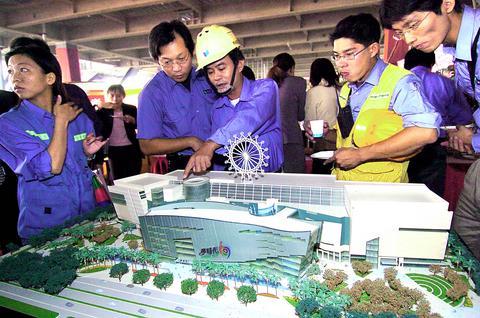The bigger, the better. That's the basic spirit behind the Uni-President Group's (
Kao made the remarks during a topping-off ceremony for the 121,000-ping (400,000m2) Dream Mall (

PHOTO: CHANG CHUNG-YI, TAIPEI TIMES
The mall, which is located next to Kaohsiung Harbor and within a 10-minute drive from the city's downtown, expects to divert shoppers from the city's smaller retailers, including Hanshin Department Store (漢神百貨), Shin Kong Mitsukoshi Department Store (新光三越) and the FE21 Mega shopping center (高雄大遠百), Kao said.
"We have no rivals here [in Kaohsiung] because no one can compare with us in terms of size," said Kao, whose group owns the nation's largest food conglomerate, Uni-President Enterprises Corp (統一企業).
"We will make it a landmark in Kaohsiung and a must-see for foreign tourists," Kao said.
The NT$30 billion (US$930 million) mall will be twice the size of the ball-shaped Core Pacific City Mall (
Rising nine stories with three basement levels, the mall will feature a small rooftop Ferris wheel, as well as department stores, hypermarkets, theme parks, gyms, a Cinemark cinema (喜滿客) and an Eslite Bookstore to offer a wide array of services, said Yeh Chih-chung (葉致中), president of the Tung Li Development Co Ltd (統立開發), which is in charge of the mall's management and operation.
With 63 percent of the mall's available space already contracted out to tenants, Yeh said they are also in talks with international brands, including LV and Gucci, to strengthen the product mix.
The mall aims to attract 12 million people a year and achieve NT$14.4 billion in first-year sales, he said.
After the mall begins operation, the company will focus on building the second phase of the project, a five-star hotel on a 8,000-ping piece of land next to the shopping center, Yeh said.
As a novice in the shopping sector, the group has cooperated with Japan's Diamond City Co Ltd to benefit from its retail know-how.
"If the mall operates well, we will duplicate the model northward to Tainan, Taichung and then Taipei," Kao said.

Sweeping policy changes under US Secretary of Health and Human Services Robert F. Kennedy Jr are having a chilling effect on vaccine makers as anti-vaccine rhetoric has turned into concrete changes in inoculation schedules and recommendations, investors and executives said. The administration of US President Donald Trump has in the past year upended vaccine recommendations, with the country last month ending its longstanding guidance that all children receive inoculations against flu, hepatitis A and other diseases. The unprecedented changes have led to diminished vaccine usage, hurt the investment case for some biotechs, and created a drag that would likely dent revenues and

Global semiconductor stocks advanced yesterday, as comments by Nvidia Corp chief executive officer Jensen Huang (黃仁勳) at Davos, Switzerland, helped reinforce investor enthusiasm for artificial intelligence (AI). Samsung Electronics Co gained as much as 5 percent to an all-time high, helping drive South Korea’s benchmark KOSPI above 5,000 for the first time. That came after the Philadelphia Semiconductor Index rose more than 3 percent to a fresh record on Wednesday, with a boost from Nvidia. The gains came amid broad risk-on trade after US President Donald Trump withdrew his threat of tariffs on some European nations over backing for Greenland. Huang further

Macronix International Co (旺宏), the world’s biggest NOR flash memory supplier, yesterday said it would spend NT$22 billion (US$699.1 million) on capacity expansion this year to increase its production of mid-to-low-density memory chips as the world’s major memorychip suppliers are phasing out the market. The company said its planned capital expenditures are about 11 times higher than the NT$1.8 billion it spent on new facilities and equipment last year. A majority of this year’s outlay would be allocated to step up capacity of multi-level cell (MLC) NAND flash memory chips, which are used in embedded multimedia cards (eMMC), a managed

CULPRITS: Factors that affected the slip included falling global crude oil prices, wait-and-see consumer attitudes due to US tariffs and a different Lunar New Year holiday schedule Taiwan’s retail sales ended a nine-year growth streak last year, slipping 0.2 percent from a year earlier as uncertainty over US tariff policies affected demand for durable goods, data released on Friday by the Ministry of Economic Affairs showed. Last year’s retail sales totaled NT$4.84 trillion (US$153.27 billion), down about NT$9.5 billion, or 0.2 percent, from 2024. Despite the decline, the figure was still the second-highest annual sales total on record. Ministry statistics department deputy head Chen Yu-fang (陳玉芳) said sales of cars, motorcycles and related products, which accounted for 17.4 percent of total retail rales last year, fell NT$68.1 billion, or